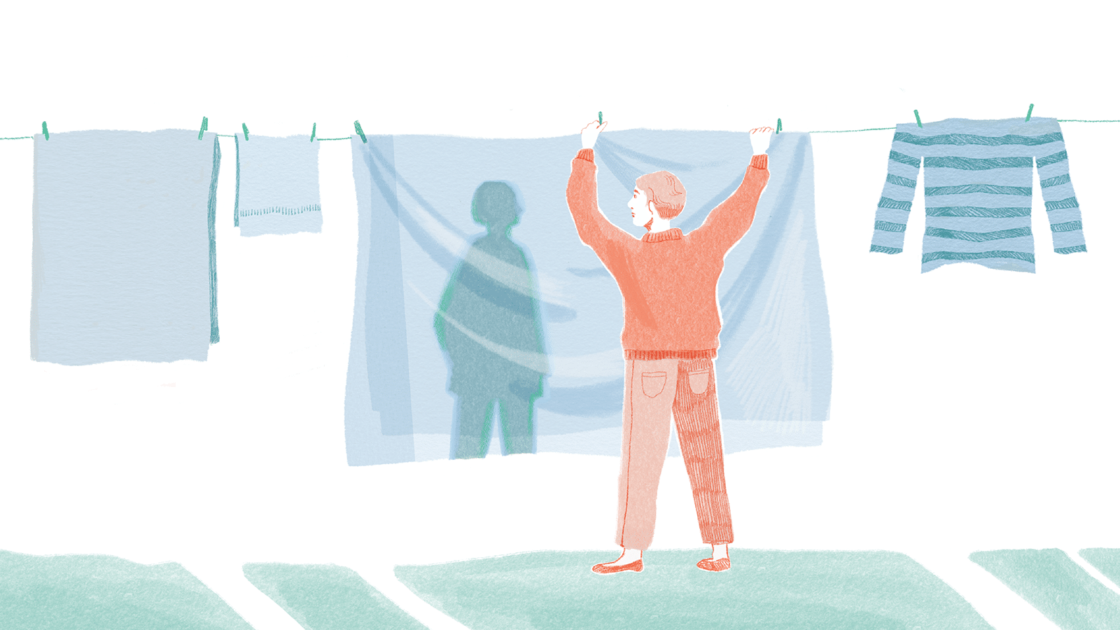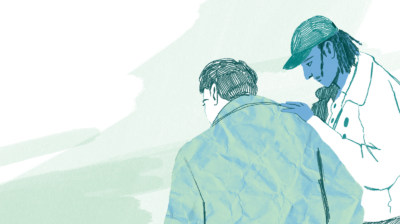How can losing someone to suicide affect you?
Suicide bereavement can have a big impact on your life. Learning about how suicide bereavement can affect people can help with healing.

Death to suicide is an overwhelming loss that can have a significant impact on your life in many ways. It can leave you with difficult and confusing emotions and a lot of unanswered questions. People don’t just ‘get over’ a suicide bereavement, but accessing the right information and support can help you process the loss over time.
What is suicide grief?
Grief is how people naturally react and adjust to loss. It can affect how you feel and how you think. It can affect you physically, socially and spiritually. Some people find it helpful to think of grief as a journey. It doesn’t happen all at once and it changes over time. For many people, grief is an ongoing process that doesn’t have an end goal. Instead of putting the loss behind you, you find ways of making sense of what happened, develop new ways to cope with the distress you feel and make adjustments to live your life without that person in it.
Everyone’s grief journey is unique, so nobody can tell you exactly what to expect along the way. This also means that you may respond very differently to the people around you when someone close to you dies by suicide.
Is suicide grief different to other forms of grief?
While they share a lot of things in common, the grief of losing someone to suicide is different to losing someone who died in another way. Suicide grief can be more complicated, painful and overwhelming for a number of reasons. Sometimes suicide is sudden and unexpected, which can lead to a lot of shock, confusion and unanswered questions. Learning about how the person died can be traumatic and difficult to process. People often experience difficult emotions like guilt when they lose someone in this way. Also, there is still lingering stigma surrounding suicide in Ireland which can make it more difficult to talk to people about the person you lost and can sometimes lead to people making insensitive or thoughtless comments.
Does suicide grief happen in stages?
You may have heard of the stages of grief that people can go through after the loss of a loved one. While different people’s grief journeys can often share common experiences, no two people grieve in the same way, and grief doesn’t happen in stages. It’s important to know this because setting expectations for how you ‘should’ be feeling after a loss or comparing where you’re at in your grief to the people around you can lead to worry and distress. Remember that your grief is unique to you. Avoid setting expectations for how you will feel by a certain time and allow yourself to grieve at your own pace.
How can suicide bereavement affect you?
Losing someone to suicide can impact your life in many different ways. Below is a list of some of the things that people can experience when they’re grieving. This doesn’t mean that you will experience all of these. There is also no particular order to these experiences, some will overlap, come and go or may be constant over time. Grief is an ongoing and changing process, so some of these experiences may appear immediately after your loss, while others might not appear until some time has passed.
Emotional symptoms of suicide grief
Losing someone to suicide can leave you with a confusing and overwhelming collection of emotions. These emotions can overlap, making it difficult to untangle them and figure out how you’re feeling. They also change and become more or less intense over time. Some emotional reactions can be unexpected and feel like they came out of nowhere. You can learn more about emotional reactions to suicide loss by reading our article on the topic. Here are some emotions that can come with grief.
- Sadness
- Anger
- Guilt
- Numbness
- Loneliness
- Anxious
- Depression
- Fear
- Regret
- Relief
- Feeling rejected
- Shock
- Shame
Cognitive symptoms of suicide grief
Losing someone to suicide can have an impact on your thoughts, especially in the days and weeks immediately after the loss. Here are some cognitive symptoms that can come with grief.
- Difficulty concentrating
- Confusion
- Asking questions
- Having trouble believing what happened
- Having flash-backs
- Having nightmares
- Having daydreams
- Having suicidal thoughts
- Slowed thinking
- Low motivation
- Short temper
- Difficulty making decisions
Physical and behavioural symptoms of suicide grief
In addition to the thoughts and emotions that come with losing someone, grief can also cause physical changes in your body and can change how you behave. Here are some of the common physical and behavioural symptoms that can come with grief.
- Feeling tired or exhausted
- Having a lack of energy
- Having trouble sleeping
- Isolating yourself
- Being restless or hyperactive
- Feeling weak
- Headaches
- Having a tightness in your chest
- A change in your appetite
- Aches and pains
- A hollow feeling in your stomach
- Increasing risky behaviours
- Increasing use of alcohol or drugs to cope
Am I experiencing ‘Complicated Grief’?
Grief doesn’t follow a set timeline, but the symptoms of grief usually become less intense as time passes. If you do not feel any relief from intense grief over time or if you feel stuck and your grief is getting worse and your pain is so severe it keeps you from living your life, you may be experiencing something called “Complicated Grief.” If you are experiencing intense grief that isn’t easing, is overwhelming you, and is holding you back from performing your normal activities at work, home or school, it’s important that you reach out for some extra support to help you manage what you’re experiencing. Read our article on how to find support for suicide bereavement to learn more.
Getting support for suicide grief
How you deal with grief is a very personal thing. You might find that what helps others is not as helpful for you. This doesn’t mean that you have to manage your grief on your own. If your life has been touched by suicide in any way, you deserve care and support to help you process what you’re going through. Here are some articles that can help.
Feeling overwhelmed and want to talk to someone?
- Get anonymous support 24/7 with our text message support service
- Connect with a trained volunteer who will listen to you, and help you to move forward feeling better
- Whatsapp us now or free-text SPUNOUT to 50808 to begin.
- Find out more about our text message support service
If you are a customer of the 48 or An Post network or cannot get through using the ‘50808’ short code please text HELLO to 086 1800 280 (standard message rates may apply). Some smaller networks do not support short codes like ‘50808’.






